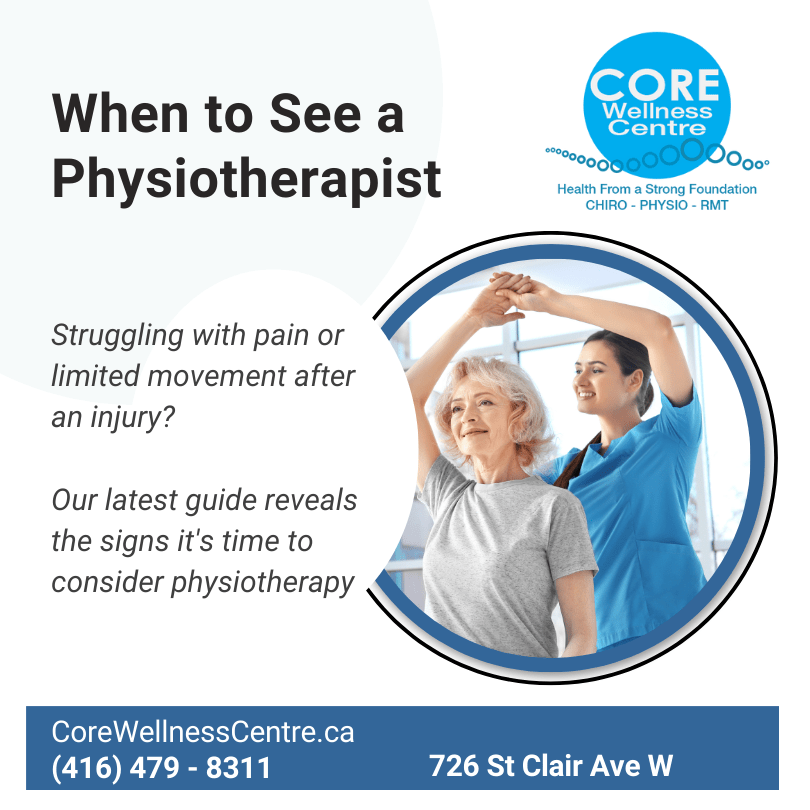Are you experiencing pain or feeling stiff after an injury or accident and interested to know when to see a physiotherapist? We see many patients in Toronto that we successfully treat to get rid of pain and be able to move freely again.
In this guide, we’ll break down eight signs that show it’s time to
get some expert advice from a physiotherapist.
Whether it’s dealing with ongoing pain or dealing with swelling that just won’t quit, we’ll talk about how physiotherapy can be the key to feeling better and getting back to doing what you love. .
When to See a Physiotherapist – From Our Toronto Clinic

8 Signs and Symptoms to Look Out For

How Physiotherapy Helps With Limited Range of Motion
Have you ever felt like your body is moving through molasses, resisting every attempt to stretch, bend or reach? Limited range of motion is more than just a minor inconvenience—it’s a barrier that stands between you and the activities you love. Whether it’s stiffness in your joints, tightness in your muscles or a combination of both, restricted movement can hinder your ability to perform even the simplest of tasks, from tying your shoes to turning your head.
Physiotherapy holds the key to unlocking your body’s full potential. Through a combination of stretching exercises, mobilization techniques and therapy, we help restore flexibility, ease stiffness and improve the overall range of motion.
The sooner you seek intervention, the better your chances of preventing further limitations and reclaiming your freedom of movement.

Recurrent Injuries
Recurring injuries can feel like trapping individuals in a cycle of pain and frustration. Whether it’s a nagging knee issue, a recurring shoulder strain, or a chronic back problem, patterns of repeated injury can signal underlying biomechanical imbalances and weaknesses that predispose individuals to further harm.
While temporary relief may be found through rest and symptomatic treatments, the underlying issues often persist, increasing
the risk of future injuries and long-term complications.
Physiotherapy plays a crucial role in breaking this cycle by addressing the root causes of recurrent injuries. Through a comprehensive assessment of movement patterns, muscle imbalances, and joint mechanics, physiotherapists can identify areas of weakness and dysfunction that contribute to injury risk.
From there, targeted interventions such as corrective exercises, manual therapy, and functional training are employed to address these imbalances and improve overall biomechanics.
The key to preventing future injuries lies in personalized treatment plans that address individual needs and goals. By focusing on strengthening weak muscles, improving flexibility, and enhancing proprioception and body awareness, we empower individuals to move with efficiency and resilience, reducing the risk of re-injury and promoting long-term musculoskeletal health.
With our guidance, individuals can break free from the cycle of recurrent injuries and embrace a future filled with vitality and well-being.
Don’t let pain hold you back any longer!
Contact our physiotherapy clinic today on (416) 479 – 8311 to make an appointment
Difficulty with Balance and Coordination
Balance and coordination problems are common consequences of injuries or accidents, often stemming from disruptions in sensory input, motor control, or vestibular function. Whether it’s a result of musculoskeletal injuries, neurological conditions, or inner ear disturbances, impaired balance and coordination can significantly impact one’s ability to move safely and confidently.
Physiotherapy plays a pivotal role in improving stability and coordination through targeted exercises and balance training programs. By challenging balance reactions and enhancing proprioception (the body’s awareness of its position in space), physiotherapists help individuals regain control over their movements and reduce the risk of falls or injuries.
Moreover, physiotherapists are trained to assess and address underlying issues contributing to balance problems. Through comprehensive evaluations, including functional movement assessments and vestibular testing, physiotherapists can identify specific deficits and develop tailored treatment plans to address them. By targeting both the symptoms and the root causes of balance and coordination problems, physiotherapy empowers individuals to regain their balance and confidence in daily activities.
Limited Functionality Despite Medication
Relying solely on medication for pain management may provide temporary relief. Medications such as painkillers or anti-inflammatories may mask symptoms without addressing the root issues, leading to a cycle of dependency and potential side effects.
Physiotherapy offers a complementary approach to medical treatment by addressing the root causes of pain and dysfunction. Through a combination of manual therapy, therapeutic exercises, and patient education, physiotherapists target biomechanical imbalances, muscle weaknesses, and dysfunctional movement patterns that contribute to pain and limited functionality.
Physiotherapy not only provides immediate relief but also empowers individuals to address the root causes of their symptoms, leading to long-term recovery and enhanced well-being.
Recognizing the signs that indicate the need for physiotherapy can be the first step towards reclaiming your health and well-being. From chronic pain and limited mobility to persistent swelling and balance problems, these symptoms are not just inconveniences—they’re signals from your body that it’s time to seek help.
If you find yourself experiencing any of these symptoms, we encourage you to take action and seek professional help. Physiotherapy offers a comprehensive approach to rehabilitation, addressing not just the symptoms but also the underlying causes of your discomfort.
Our team of skilled physiotherapists is here to guide you through your healing journey, providing personalized assessment and treatment options
tailored to your unique needs and goals.
Don’t let pain hold you back any longer!
Contact our physiotherapy clinic today on (416) 479 – 8311 to make an appointment towards healing and recovery.
You deserve the best care possible, and we’re here to help you achieve it!

